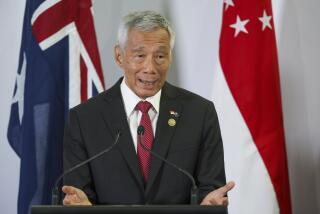Hong Kong Attempts to Repair Damage
- Share via
HONG KONG — Beleaguered Chief Executive Tung Chee-hwa announced two key Cabinet appointments Monday and offered a rhetorical olive branch to the public as he struggled to repair some of the political damage caused by last month’s large anti-government protests.
Appearing briefly at a packed news conference in the government’s central headquarters building, Tung introduced 51-year-old Henry Tang, secretary for commerce, industry and technology, as his new financial secretary, and career civil servant Ambrose Lee, 54, as secretary for security. The jobs are among the most influential -- and controversial -- in Hong Kong’s quasi-autonomous regional government.
The previous occupants of the posts -- Financial Secretary Antony Leung and Security Secretary Regina Ip -- resigned last month after they became growing targets of public criticism. They were singled out by many of the hundreds of thousands of demonstrators who took to the streets in early July to voice discontent with what they perceived as the inept, arrogant and aloof style of Tung’s government.
Among their main grievances was a highly unpopular anti-subversion bill under Ip’s stewardship. Leung departed amid allegations of corruption and having done little to address Hong Kong’s severe economic woes.
In presenting his new appointees, Tung said the men “will help us move toward a more open, progressive and efficient government.”
In an apparent effort to reinforce that message, both appointees repeatedly stressed their commitment to greater dialogue in the government’s dealings with the public.
“I’ll be transparent. I will listen to all views and be pragmatic in my workings,” Tang pledged.
Lee, who assumes primary responsibility for the disputed anti-subversion bill, pledged a new round of public consultations before any revised draft is presented to the region’s Legislative Council. He refused to commit to any deadline for the process.
“I can only say I’ll be listening to the views of the community very closely,” he said. “We don’t have an exact timetable for this legislation.”
Tung’s earlier efforts to push the bill through against stiffening public opposition, coupled with Ip’s abrasive style, were key factors behind the anti-government protests. The demonstrations left Tung reeling and Hong Kong’s political future suddenly filled with questions, and Monday’s developments, including the conciliatory words, were viewed more as a tentative first step toward building public trust than an end to Tung’s problems.
On Sunday, a loose grouping of political interests, including a sprinkling of legislators, academics and business professionals, launched Anti-Tung Solidarity, a movement aimed at forcing Tung to resign and establishing a fully democratic government in Hong Kong. Organizers say about 1,700 people have so far applied for membership.
The formula under which Hong Kong reverted to Chinese rule six years ago -- known as one country, two systems -- allows for a review and possible expansion of Hong Kong’s limited democracy in 2007.
Under the current system, the territory’s chief executive is selected by a tiny fraction of Hong Kong’s 7 million people, and only 24 of the Legislative Council’s 60 members are directly elected.
More to Read
Sign up for Essential California
The most important California stories and recommendations in your inbox every morning.
You may occasionally receive promotional content from the Los Angeles Times.









